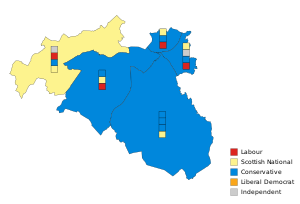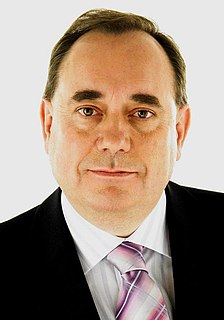
The 2012 Scottish local elections, were held on 3 May, in all 32 local authorities. The Scottish National Party (SNP) overtook Labour to win the highest share of the vote, and retained and strengthened its position as the party with most councillors. Labour also made gains, while the Liberal Democrats experienced meltdown, falling behind the Conservatives. For the first time since the introduction of the Single Transferable Vote system, the SNP won majority control of 2 councils, from no overall control. Labour also won majority control of 2 councils from no overall control, while retaining majority control over 2 councils.

The 2012 Midlothian Council election took place on 3 May 2012 to elect members of Midlothian Council. The election used the six wards created as a result of the Local Governance (Scotland) Act 2004, with each ward electing three or four Councillors using the single transferable vote system a form of proportional representation, with 18 Councillors being elected.

Elections to East Lothian Council were held on 3 May 2012, on the same day as the other Scottish local government elections. The election used the 7 wards created as a result of the Local Governance (Scotland) Act 2004, with each ward electing three or four councillors using the single transferable vote system a form of proportional representation, with 23 councillors elected.

The 2012 South Ayrshire Council election took place on 3 May 2012 to elect members of South Ayrshire Council. The election used the eight wards created as a result of the Local Governance (Scotland) Act 2004, with each ward electing three or four Councillors using the single transferable vote system a form of proportional representation, with 30 Councillors being elected.
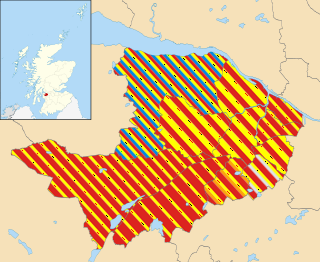
The 2012 Renfrewshire Council election took place on 3 May 2012 to elect members of Renfrewshire Council. The election used the eleven wards created as a result of the Local Governance (Scotland) Act 2004, with each ward electing three or four Councillors using the single transferable vote system a form of proportional representation, with 40 Councillors being elected.
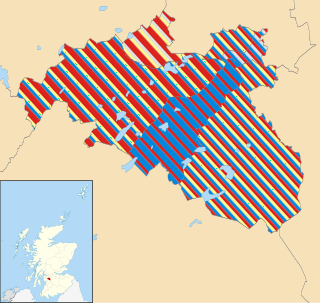
The 2012 East Renfrewshire Council election took place on 3 May 2012 to elect members of East Renfrewshire Council. The election used the six wards created as a result of the Local Governance (Scotland) Act 2004, with each ward electing three or four Councillors using the single transferable vote system a form of proportional representation, with 20 Councillors being elected.
Elections to East Dunbartonshire Council were held on 3 May 2012, the same day as the 31 other local authorities in Scotland. The election used the eight wards created under the Local Governance (Scotland) Act 2004, with 24 Councillors being elected. Each ward elected either 3 or 4 members, using the STV electoral system.

The Glasgow City Council election of 2017 was held on 4 May 2017, the same day as the 31 other Scottish local government elections. The election was the first to use 23 new wards, created as a result of the Local Government Boundary Commission for Scotland's 5th Review. Each ward elected three or four councillors using the single transferable vote system, a form of proportional representation used since the 2007 election and according to the Local Governance (Scotland) Act 2004.
Elections to East Lothian Council will be held on 4 May 2017 on the same day as the other Scottish local government elections. The election will consist of 6 wards electing three or four Councillors using the single transferable vote system a form of proportional representation, with 22 Councillors elected.

Elections to Fife Council were held on 4 May 2017, the same day as the other Scottish local government elections. The election used the 22 wards created as a result of the Local Government Commission for Scotland's 5th review which was published in September 2016, with each ward electing three or four councillors using the single transferable vote system a form of proportional representation, with 75 councillors elected; a decrease of three seats from 2012 as one ward, The Lochs, was abolished.

The elections to Moray Council were held on Thursday 4 May 2017, on the same day as the 31 other local authorities in Scotland. It was the third successive Local Council election to run under the STV Electoral System. The election used the eight wards created under the Local Governance (Scotland) Act 2004, with 26 Councillors being elected. Each ward elected either 3 or 4 members, using the STV electoral system.

The Clackmannanshire Council election of 2017 was held on 4 May 2017, on the same day as the 31 other local authorities in Scotland. It was the third successive election to run under the STV electoral system and used the five wards created under the Local Governance (Scotland) Act 2004, with 18 councillors being elected.
Elections to East Dunbartonshire Council were held on Thursday 4 May, the same day as the 31 other local authorities in Scotland. The election used seven wards created under the Local Governance (Scotland) Act 2004, a reduction of one from 2012, with 22 Councillors being elected, 2 fewer overall. Each ward elected either 3 or 4 members, using the STV electoral system.
Elections to Falkirk Council will be held on 4 May 2017, the same day as the 31 other local authorities in Scotland. The election will use the nine wards created under the Local Governance (Scotland) Act 2004, with 30 councillors being elected, a reduction of 2 members from 2012. Each ward will elect either 3 or 4 members, using the STV electoral system.

Elections to Stirling Council were held on 4 May 2017, the same day as the 31 other local authorities in Scotland. The election used the seven wards created under the Local Governance (Scotland) Act 2004, with 23 councillors being elected, an increase of 1 from 2012. Each ward elected either 3 or 4 members, using the STV electoral system. Following the Fifth Electoral Review by the Local Government Boundary Commission for Scotland, minor changes were made to several of the ward boundaries and one additional Councillor was added moving the total number of Councillors from twenty-two to twenty-three.
The 2017 Renfrewshire Council election took place on 4 May 2017 to elect members of Renfrewshire Council. The election will use the twelve wards created as a result of the 2015-16 Boundary Commission review, with each ward electing three or four Councillors using the single transferable vote system, a form of proportional representation, with 43 Councillors being elected, a net increase of 3 members compared to the 2012 Council. Councillor Stuart Clark of the Labour Party resigned in November 2016, and his position had not yet been filled when the council was dissolved before the election.
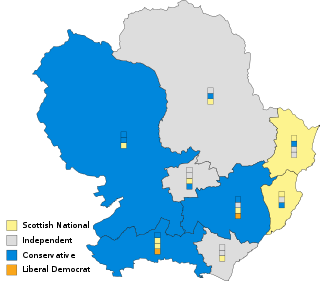
Elections to Angus Council were held on 4 May 2017 the same day as the other Scottish local government elections. The election used the eight wards, created as a result of the Local Governance (Scotland) Act 2004, with each ward electing three or four Councillors using the single transferable vote system a form of proportional representation, with 28 Councillors being elected, a reduction of 1 compared to 2012.
The 2017 Highland Council election was held on 4 May 2017 to elect members of Highland Council. The election used the 21 wards created under the Local Governance (Scotland) Act 2004; each ward elected three or four councillors using the single transferable vote system. A total of 74 councillors were elected, six less than in 2012.

The 2017 Dumfries and Galloway Council election took place on 4 May 2017 to elect members of Dumfries and Galloway Council. The election used the twelve wards created as a result of the Local Governance (Scotland) Act 2004, with each ward electing three or four councillors using the single transferable vote system a form of proportional representation, with 43 councillors being elected, a reduction of 4 members and 1 ward since 2012.
